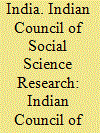| Srl | Item |
| 1 |
ID:
096087


|
|
|
|
|
| Publication |
2010.
|
| Summary/Abstract |
Achieving the ambitious targets for carbon emissions reductions that are necessary to reduce the risks associated with climate change will require significant changes in the way people use energy. Redesigning energy technologies at a societal level is certainly a major scientific challenge, however, succeeding in this endeavor requires more than getting the engineering right. Technologies can fail to win public approval for a variety of reasons. Good social science research, coordinated properly with technological R&D, is an essential part of the solution. Social science research is needed to: clarify the behavioral changes that can reduce energy consumption; characterize public understandings and concerns of new energy technologies; help overcome barriers to public adoption; maximize the benefits for users; and better understand society's needs and abilities to make energy transitions. We argue that social science research into the human dimensions of new energy technologies be promoted and overseen by a new office of social science research to be established in the United States Department of Energy. The funding levels needed for these endeavors are a tiny fraction of the amount that was allocated to carbon sequestration research in the 2009 stimulus bill.
|
|
|
|
|
|
|
|
|
|
|
|
|
|
|
|
| 2 |
ID:
126355


|
|
|
|
|
| Publication |
2013.
|
| Summary/Abstract |
We marshal discoveries about human behavior and learning from social science research and show how these can be used to improve teaching and learning. The discoveries are easily stated as three social science generalizations: (1) social connections motivate, (2) teaching teaches the teacher, and (3) instant feedback improves learning. We show how to apply these generalizations via innovations in modern information technology inside, outside, and across university classrooms. We also give concrete examples of these ideas from innovations we have experimented with in our own teaching.
|
|
|
|
|
|
|
|
|
|
|
|
|
|
|
|
| 3 |
ID:
035422


|
|
|
|
|
| Publication |
New Delhi, Indian Council of Social science Research, 1980.
|
| Description |
185p.pbk
|
| Series |
Publication no.; 119
|
|
|
|
|
|
|
|
|
|
|
|
Copies: C:1/I:0,R:0,Q:0
Circulation
| Accession# | Call# | Current Location | Status | Policy | Location |
| 019089 | 300.05/IND 019089 | Main | On Shelf | General | |
|
|
|
|
| 4 |
ID:
110661


|
|
|
|
|
| Publication |
2011.
|
| Summary/Abstract |
The ubiquity of data in the twenty-first century provides unprecedented opportunities for social science research, but it also creates troubling possibilities for privacy violations. The emerging field of statistical disclosure control (SDC) studies how data collectors and analysts can find an optimal solution to balancing privacy protection and data utility. This article introduces SDC to readers in the applied political science research community and outlines its implications for analyzing individual-level data. The vocabulary of SDC is introduced and is followed with a discussion emphasizing just how easy it is to break almost any release of supposedly "anonymized" data. The article then describes how SDC measures almost always destroy the ability of researchers to accurately analyze complex survey data. These results are in conflict with increasing trends toward greater transparency in the social sciences. A discussion of the future of SDC concludes the article.
|
|
|
|
|
|
|
|
|
|
|
|
|
|
|
|
| 5 |
ID:
098202


|
|
|
|
|
| Publication |
2010.
|
| Summary/Abstract |
We investigate differences in what students learn about survey methodology in a class on public opinion presented in two critically different ways: with the inclusion or exclusion of an original research project using a random-digit-dial telephone survey. Using a quasi-experimental design and data obtained from pretests and posttests in two public opinion courses, we test the hypothesis that students who participate in an original survey research project will have a stronger understanding of survey research methods than students who do not. To better assess the effect of the active learning element of the course, we estimate average treatment effects on the students who participated in the original survey project using nearest neighbor matching (Abadie et al. 2004) with student scores on a pretest. We find evidence of modest improvement in learning of survey methods in the course featuring the original survey research project; however, the major finding here is that a course featuring this kind of opportunity appeals to a different kind of student than a course that allows participants to stay closer to the classroom and library instead of the social science research laboratory. This discovery may have important implications for our understanding of the effects of active learning opportunities in other types of elective courses.
|
|
|
|
|
|
|
|
|
|
|
|
|
|
|
|